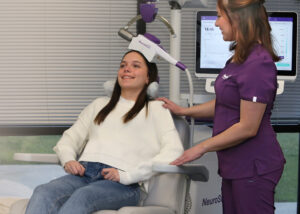

Finding the right treatment for mental health conditions like depression can be challenging. While medications and psychotherapy work for many, they aren’t effective for everyone.
That’s where Transcranial Magnetic Stimulation (TMS) comes in.
TMS is a non-invasive, drug-free therapy that has shown promising results for individuals who haven’t found relief through traditional treatments.
But how do you know if TMS is the right choice for you?
TMS therapy uses magnetic pulses to stimulate certain areas of the brain that control mood. It’s a treatment for depression and other mental health problems.
TMS is different from Electroconvulsive Therapy (ECT) because you stay awake during the session and don’t need anesthesia. The treatment involves placing a small device on your head that sends magnetic pulses into the brain.
Each session lasts 20-40 minutes, and you usually need daily treatments for 4-6 weeks.
Since TMS is non-invasive, you can return to your normal activities right after each session.
TMS therapy is a good option for people with Major Depressive Disorder (MDD) who haven’t responded well to medications or therapy.
If you’ve tried antidepressants but didn’t find relief or had bad side effects, TMS might be worth trying. TMS is also helpful for people with Generalized Anxiety Disorder (GAD) and Obsessive-Compulsive Disorder (OCD).
Even though it’s mainly used for depression, TMS can treat other conditions without the side effects of drugs.
TMS therapy has several benefits that make it an appealing option for individuals looking for alternative mental health treatments:
Evaluating if TMS therapy is right for you depends on several factors.
It’s particularly effective for those who have struggled with chronic depression or anxiety for a long time and haven’t seen improvement with traditional treatments.
If you prefer a non-invasive and drug-free treatment option, TMS might be an ideal choice.
However, certain conditions may make you ineligible for TMS therapy.
For example, individuals with metal implants in or near their heads, such as cochlear implants or aneurysm clips, should avoid TMS. Those with a history of seizures should also consult with their healthcare provider to determine if TMS is safe for them.
If you think TMS might be the right fit for you, the first step is to get an evaluation by a healthcare provider. They will assess your medical history, current symptoms, and previous treatment attempts to determine if TMS is a suitable option.
At Mercyland Psychiatry, we offer a comprehensive consultation process to help you decide whether TMS is the right therapy for your mental health journey.
Tired of feeling like nothing works?
Don’t let depression or anxiety keep holding you back. With TMS therapy, you have the chance to rediscover your best self—without the side effects of medication. If you're ready to explore a new path to mental wellness, we’re here to help.
At Mercyland Psychiatry, we offer personalized consultations to determine if TMS is the right solution for you. It’s time to break free from the cycle and take the next step toward lasting relief.
Schedule your consultation today and get ready to embrace a brighter tomorrow!